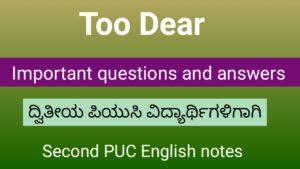
Too Dear question and answer for second PUC students. Questions and answers of Too Dear is given for class 12 students. Too Dear notes.
In this post we have discussed Too Dear question and answer for puc second year students.
To get more video notes for PUC second year visit our YouTube channel. This channel is very useful for second puc exam.
Too Dear important questions
📘 Too Dear – 2nd PUC English Notes (Comprehension I, II & III)
🧠 Comprehension I: Key Points & Answers
🔹 1. Why was ‘Monaco’ called a ‘toy kingdom’?
- Because it had just about seven thousand people.
🔹 2. Name the commodities taxed in Monaco.
- Tobacco, wine, and spirits.
🔹 3. What was the source of the King’s special revenue? Who were its beneficiaries?
- The gaming house was the source of special revenue.
- Beneficiaries: The King and the gaming house keeper.
🔹 4. Why did the Germans stop gaming houses in their country and how did it benefit Monaco?
- Gaming houses caused more harm.
- Monaco benefited as it became the only place in Europe that allowed gambling.
🔹 5. What was the punishment given to the murderer?
- Death sentence / Capital punishment / Execution
🔹 6. The death sentence was converted into life imprisonment because:
- (b) Carrying out death sentence was expensive.
🔹 7. How much did the king spend on the criminal annually?
- 600 francs per year.
🔹 8. On what condition did the criminal agree to go away from the prison? Why was his demand fulfilled?
- He agreed to leave if paid an annual pension.
- His demand was fulfilled to avoid further maintenance burden.
✍️ Comprehension II: Short Answer Questions
🔹 1. Though gambling is a dirty business, why does the King of Monaco resort to it?
The King of Monaco ruled a small kingdom with a limited population and insufficient revenue. To maintain his royal lifestyle and administrative structure, he had to look for additional sources of income. Despite knowing that gambling is morally questionable, he established a gaming house to attract people from outside, ensuring a steady income for his kingdom’s survival.
🔹 2. Why did the King keep changing his mind in dealing with the criminal?
Initially, the criminal was sentenced to death, but Monaco lacked the means to execute the sentence. The French government’s cost was too high, and even Italy’s offer seemed expensive. The idea of using a soldier also failed. Consequently, the sentence was changed to life imprisonment. However, maintaining the prisoner was costly, and when he didn’t escape after the guard was removed, a final solution was to release him on a pension. This series of decisions reflects the King’s indecision and practicality.
🔹 3. Why was the criminal reluctant to go out of the prison?
The criminal did not want to leave the prison because he felt ruined by the sentence. He had no home or job to return to and believed society would reject him. His time in confinement had made him unfit for the outside world, and he feared starting life again with a damaged reputation.
🔹 4. How did the criminal lead his life after his release?
Once released, the criminal moved just outside the King’s territory and lived a peaceful life. He used his pension to buy land and began market gardening. Occasionally, he visited the gaming house to gamble small amounts. Despite his past, he adjusted well and lived comfortably and independently.
📖 Comprehension III: Long Answer Questions
🔹 1. “You can’t earn stone palaces by honest labour” – Explain.
This statement highlights the irony in the King of Monaco’s lifestyle. With limited revenue sources, he managed to maintain a luxurious royal setup, including a palace, courtiers, and military. To fund this, he relied on gambling, a morally questionable yet profitable venture. The quote implies that such grandeur cannot be achieved through honest labor alone but often requires ethically doubtful methods.
🔹 2. Though comic, the story raises serious questions – Explain.
While the story is presented humorously, it critiques the flaws in governance and the legal system. The authorities sentenced a criminal to death without the means to carry it out, exposing their lack of preparedness. The contradiction of profiting from gambling while punishing crime also reveals societal hypocrisy. The legal inconsistencies and the comic turn of events underline serious concerns about justice and administration.
🔹 3. Were there better ways to deal with the crime?
The King could have banned gambling like other European nations, possibly avoiding the crime altogether. Instead of a costly and impractical death sentence, life imprisonment from the start would have been more humane and efficient. Additionally, employing the criminal in some useful work would have saved money and helped him reintegrate into society. These alternatives reflect a more thoughtful and progressive approach.
💡 Conclusion / Final Notes:
Too Dear uses satire to highlight flaws in justice and governance. It presents serious issues like capital punishment and social responsibility in a humorous way. The lesson offers strong messages on administration, ethics, and decision-making.
📚 Perfect for quick revision and exam preparation!
Watch this video for the explanation of Too Dear question and answer.
🔗 Tags: #TooDear #TooDearLesson #TooDear2ndPUC #2ndPUCEnglishNotes #PUCEnglishComprehension #TooDearSummary #2ndPUCLessonNotes #PUCStudyTips #KarnatakaPUC2025 #TooDearQuestionAnswers #EnglishComprehensionNotes #TooDearImportantQuestions #PUCEnglishUnit3 #PUCExamPreparation #TooDearLeoTolstoy #PUCLongAnswers #2ndPUCImportantLessons #TooDearExplanation #PUCEnglishGrammarHelp #TooDearKeyPoints #TooDearNotesPDF